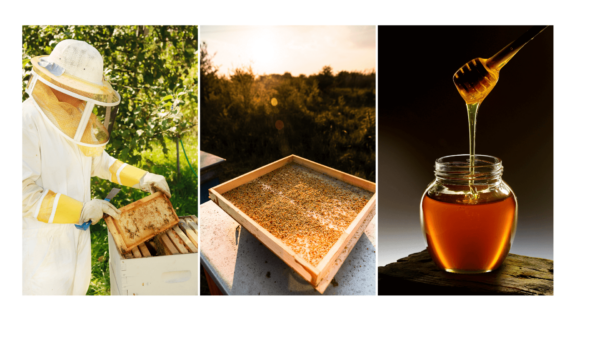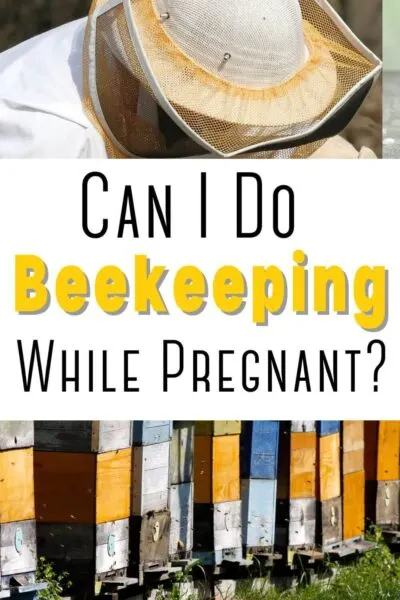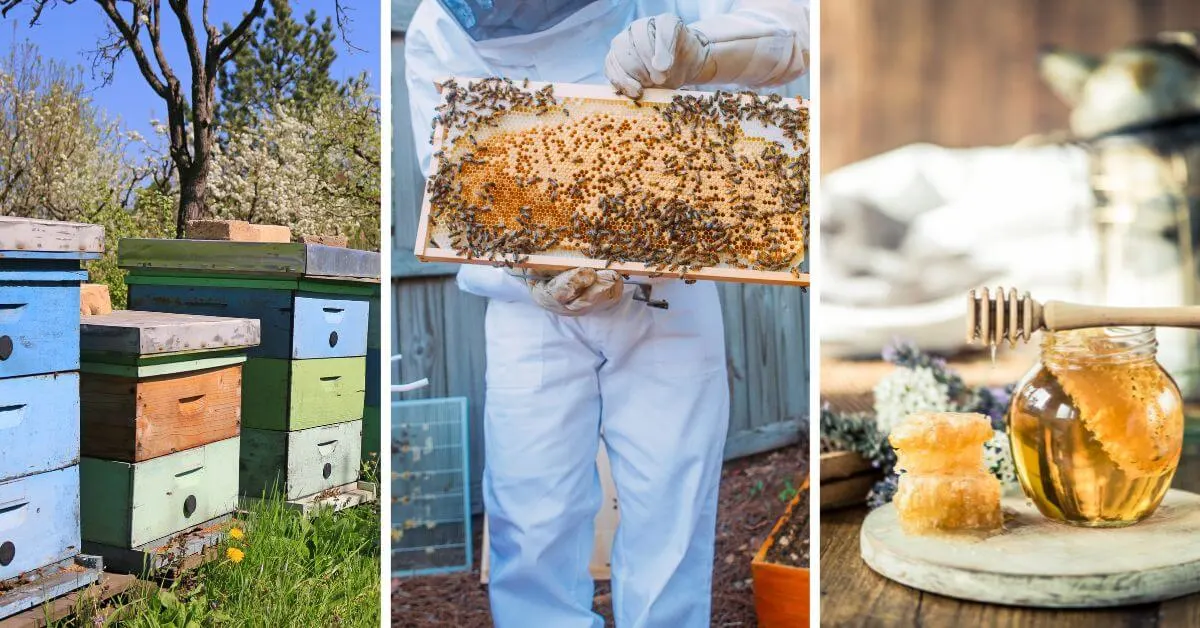Updated August 3, 2022
Are you a pregnant woman who’s wondering if you can do beekeeping while pregnant?
You’re not alone – many women are curious about the safety of this activity during pregnancy.
In this blog post, we’ll explore the possible risks and benefits of beekeeping while pregnant, so you can make an informed decision about whether or not to continue with this hobby while pregnant.
We’ll also provide some tips for staying safe while keeping bees.
In the United States alone, there are 212,000 beekeepers, some participate in the UD partner program while others are hobbyists or do beekeeping as a side hustle.
Given this large number of beekeepers, it is no surprise that there are many pregnant women asking the question: Can I do beekeeping while pregnant?

When discussing this topic it is reasonable to assume that women who are pregnant seeking this information are established beekeepers and are not starting beekeeping for the first time while pregnant.
However, there are also those who want to know about exposure to bees while pregnant whether or not they are in the business of beekeeping.
Can I Do Beekeeping While Pregnant?
Many women are interested in beekeeping while pregnant but are unsure if it is safe.
The good news is that, in most cases, pregnant beekeeping is safe.
However, there are a few things to keep in mind.
First of all, it is important to avoid being stung by a bee.
If you are allergic to bee stings, beekeeping may not be right for you.
Additionally, it is important to wear protective clothing while working with bees.
This includes a veil, gloves, and long pants and sleeves.
Finally, it is important to take care when lifting hives and frames of honey.
Beekeeping can be a great hobby for expecting mothers, but it is important to take precautions to avoid being injured by a bee sting.
While there are many benefits to beekeeping, such as producing honey and pollinating crops, it is important to be aware of the potential risks before beginning this activity, especially if you are pregnant.
Bee stings can cause swelling and pain, and in rare cases, they can trigger an allergic reaction.
It is important to reiterate that beekeeping is definitely not a hobby or career to start during pregnancy.
Becoming proficient at managing bee colonies takes experience.
So if you are an experienced beekeeper who wants to know how to manage a colony while pregnant, this is definitely an important question to ask when it comes to the health and safety of you and your baby.
There are many details beekeepers need to know and we will discuss them to hopefully answer your questions.
Beekeeping is a job that has a learning curve and requires experience.

What is the risk of beekeeping while pregnant? What are the dangers involved in beekeeping?
It should be no surprise that the most significant risk associated with beekeeping is the possibility or should we say the likelihood of getting stung by one or more bees.
The level of concern over this is going to be based on your medical history and if you have had an allergic reaction to a bee sting in the past.
If you are known to be allergic to bees, working around them must be avoided.
Even if you had a minor allergic reaction to a bee sting in the past, once your immune system has been exposed to the venom, the reaction to another bee sting can be more severe because your immune system has developed a sensitivity to bee stings.
There is also the possibility that you may have had no reaction to a bee sting and then have a reaction should you be stung by multiple bees at one time.
The concern with multiple stings is that you’ll have an anaphylactic allergic reaction.
Anaphylactic reactions can be very serious and if not treated properly can be lethal.
Symptoms of Anaphylactic Shock:
- dizziness
- fainting
- difficulty breathing
- swelling of the tongue or throat
- vomiting or nausea
- flushed or pale skin
- hives and itching
- loss of consciousness.
Even if you have been stung by a bee in the past and did not experience a significant allergic response, care must be taken using protective beekeeping equipment to prevent multiple stings which could result in an anaphylactic reaction.
Individuals with a history of bee sting allergies, often have injectable adrenaline readily available (EpiPen/epinephrine) available to treat a severe reaction.
The use of epinephrine can in turn cause high blood pressure resulting in possible pregnancy complications.
This is yet another reason to avoid exposure to bees while pregnant even if you have an EpiPen available.
Another issue with beekeeping during pregnancy is potential back injuries and back pain from the improper lifting of hives and frames.
If possible you may want to have someone else do the heavy lifting while you are pregnant.
We don’t do beekeeping on our homestead but know many people who do, and they have all talked about how heavy their beehives are.
It is also very important to stay well-hydrated and avoid extreme heat while you are tending to your bees.
This can be difficult during the hot summer months, especially when the best time to check on your hives coincides with the middle of the day.
Keep a cold water bottle with you and if you feel tired or start to feel overheated, go inside and rest.
If possible try to drink fluids with electrolytes like Gatorade or Powerade.
How Do You Decide If You Should Stop Beekeeping While Pregnant?
Though most pregnant beekeepers will not experience problems, the only one who can decide if you should continue beekeeping during pregnancy is you.
The decision is ultimately based on your personal medical history and level of experience.
So let’s review the factors (many of which we have discussed) that will impact your decision:
- Are you allergic to bee stings? If you don’t know because you have never been stung, then it is likely you’re not currently a beekeeper and would want to consider beekeeping after your pregnancy.
- Risk Tolerance – this varies tremendously from one individual to another. With beekeeping, this is particularly important since managing bees requires that you remain calm. If your comfort level managing bees is going to be stressful, this can result in you reacting in ways that can disturb the hive and cause the bee hive to become aggressive.
- Income – Sure, it can be easy to say, “just don’t do beekeeping while pregnant”; however, if beekeeping is the household’s primary source of income this may not be an option. In this case, perhaps another individual in the family can manage the bee hives during your pregnancy.
If you have decided that you want to continue beekeeping during pregnancy, there are things you can do to decrease the risk of getting stung.

How to reduce the risk of being stung while beekeeping:
- The best time to evaluate your bee hives is in the middle of the morning or afternoon when the colony count will be lowest.
- Smoking the hive reduces activity since the bees will go into hiding in preparation to build another hive.
- Move slowly when around any bee hive as bees are easily startled, and if you were to get stung, try not to overreact.
- Wear white protective beekeeper clothing, including a veil, gloves and ankle protection to keep bees from getting inside your clothing. (There are beekeepers who do not use gloves and this is a personal choice though during pregnancy it is not worth the risk, nor is it recommended.)
- Do not obstruct the entrance to the bee hive in any way as this makes the bees feel threatened.
Should you get stung it is important to minimize the disruption of the hive.
If you are stung by a bee, a pheromone is released to signal potential danger to the rest of the hive.
For this reason, it is essential to remain calm and move slowly.
Even if you have been stung in the past and did not experience an allergic reaction, experiencing multiple bee stings could cause an anaphylactic reaction.
Final Thoughts:
While there are some risks associated with beekeeping, the benefits of this activity seem to outweigh the potential dangers.
If you are pregnant and passionate about keeping bees, it is important to take some precautions to minimize your risk of being stung.
With a little bit of research and preparation, you can enjoy this fascinating hobby while safely nurturing your new baby.
Related articles:
Is it safe to have a guinea pig while pregnant?
Can You Eat Guinea Fowl When Pregnant?


